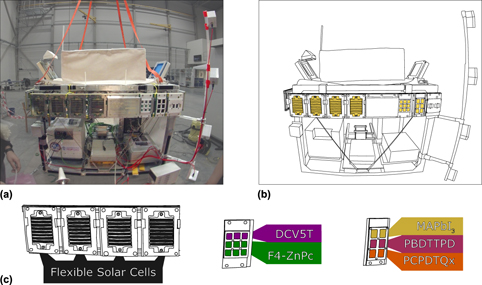Crossref Citations
This article has been cited by the following publications. This list is generated based on data provided by
Crossref.
Coburn, Caleb
Fan, Dejiu
and
Forrest, Stephen R.
2019.
Organic Charge-Coupled Device.
ACS Photonics,
Vol. 6,
Issue. 8,
p.
2090.
Barbé, Jérémy
Pockett, Adam
Stoichkov, Vasil
Hughes, Declan
Lee, Harrison Ka Hin
Carnie, Matthew
Watson, Trystan
and
Tsoi, Wing C.
2020.
In situ investigation of perovskite solar cells’ efficiency and stability in a mimic stratospheric environment for high-altitude pseudo-satellites.
Journal of Materials Chemistry C,
Vol. 8,
Issue. 5,
p.
1715.
Iwan, Agnieszka
Pellowski, Witalis
and
Bogdanowicz, Krzysztof A.
2021.
Conversion of Radiophotoluminescence Irradiation into Electricity in Photovoltaic Cells. A Review of Theoretical Considerations and Practical Solutions.
Energies,
Vol. 14,
Issue. 19,
p.
6186.
Reb, Lennart K.
Böhmer, Michael
Predeschly, Benjamin
Grott, Sebastian
Dreißigacker, Christoph
Drescher, Jörg
Meyer, Andreas
and
Müller-Buschbaum, Peter
2021.
An experiment for novel material thin-film solar cell characterization on sounding rocket flights.
Review of Scientific Instruments,
Vol. 92,
Issue. 7,
Datt, Ram
Lee, Harrison Ka Hin
Zhang, Guichuan
Yip, Hin‐Lap
and
Tsoi, Wing Chung
2022.
Organic Solar Cells at Stratospheric Condition for High Altitude Platform Station Application†.
Chinese Journal of Chemistry,
Vol. 40,
Issue. 24,
p.
2927.
Reb, Lennart K.
Böhmer, Michael
Predeschly, Benjamin
Spanier, Lukas V.
Dreißigacker, Christoph
Meyer, Andreas
and
Müller-Buschbaum, Peter
2022.
Attitude Determination in Space with Ambient Light Sensors using Machine Learning for Solar Cell Characterization.
Solar RRL,
Vol. 6,
Issue. 11,
Urbina, Antonio
2022.
Sustainable Solar Electricity.
p.
85.
Fan, Xiaojuan
2022.
Flexible dye-sensitized solar cells assisted with lead-free perovskite halide.
Journal of Materials Research,
Vol. 37,
Issue. 4,
p.
866.
Nguyen, Dang-Thuan
Walter, Daniel
Weber, Klaus J.
Duong, The
and
White, Thomas P.
2023.
Simulating Proton Radiation Tolerance of Perovskite Solar Cells for Space Applications.
Advanced Energy and Sustainability Research,
Vol. 4,
Issue. 12,
Nguyen, Dang‐Thuan
Bui, Anh Dinh
Huang, Keqing
Leung, Tik Lun
Chang, Li‐Chun
Nguyen, Khoa
Tabi, Grace Dansoa
Trần‐Phú, Thành
Nguyen, Hieu
Ho‐Baillie, Anita
Kluth, Patrick
Weber, Klaus
White, Thomas
and
Duong, The
2024.
Void Formation and Radiation‐Induced Ion Migration in Perovskite Solar Cells under 10 MeV Proton Radiation.
Solar RRL,
Vol. 8,
Issue. 9,
